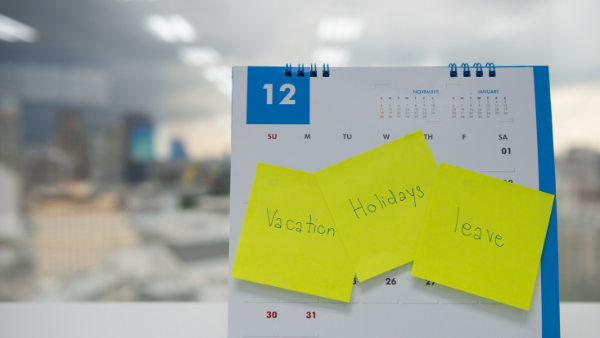Authors
Employers may now require employees to take holiday whilst on furlough
The interaction between furlough and annual leave is something which has not been afforded particular clarity by the Government since the Coronavirus Job Retention Scheme (the Scheme) began.
Previous iterations
The Scheme guidance had seen multiple iterations before we had confirmation that employees were permitted to take holiday during a period of furlough. During any such holiday taken, employers would need to ‘top up’ the 80% Government grant to ensure that employees’ normal holiday pay was paid throughout. This option was attractive to some employees, given that they would receive full pay during the holiday period
However, others preferred to hedge their bets, saving their accrued holiday entitlement for a time later in the year when the travel industry might reopen, rather than using annual leave to continue to sit in their homes whilst on furlough.
This raised the question of whether employers could compel their employees to take annual leave during furlough, a question on which, until now, the Government has refused to be drawn. Some employees were forging through the holiday year with the majority of their annual leave entitlement intact. This could cause huge operational difficulties upon a return to normal business levels, where (particularly with a reopening of the travel industry), employees might be clamouring to take 100% of their leave in 20% of the usual time.
EU-derived provisions relating to holiday
The widely-held view was that employers could not compel their employees to take annual leave during furlough, as it conflicted expressly with the EU-derived provisions relating to holiday. These require that the primary purpose of the leave be ‘rest, play and away’ – i.e. a period of rest and relaxation away from the place of work.
It followed that, if an employee was placed on furlough which, although likely to be subject to consent, was not necessarily a choice made willingly by the employee, and was akin to a ‘lay-off’ situation as a result of the current crisis, this was not consistent with the spirit of the annual leave provisions.
Government clarification
However, the Government has now sought to clarify the position. In what is likely to be a policy decision, rather than a strict interpretation of employment legislation, it has issued guidance entitled “Holiday entitlement and pay during Coronavirus (COVID-19)”. This states:
“If an employer requires a worker to take holiday whilst on furlough, the employer should consider whether any restrictions the worker is under, such as the need to socially distance or self-isolate, would prevent the worker from resting, relaxing and enjoying leisure time, which is the fundamental purpose of holiday.”
This is perhaps not as clear as employers would have hoped. Whilst it now seems unequivocal that there is a right for employers to require employees to take holiday (“if an employer requires a worker to take holiday whilst on furlough…”), this is qualified by the words “the employer should consider whether any restrictions…would prevent the worker from…enjoying…the fundamental purpose of holiday”.
What are the practical implications?
This seems to suggest that, where an employee cannot properly utilise their annual leave in the usual way, the employer may not be able to force them to take such leave. The guidance states expressly that social distancing might be a factor in this decision. As this is something that the entire population is likely to need to continue to observe for some time, it is unclear how any employees will be able to enjoy the ‘fundamental purpose’ of holiday and, by implication, the precise circumstances in which employers will be able to impose it.
The guidance does comment that furloughed employees are unlikely to need to take advantage of the recent expansion of the leave carry-over provisions (where it has not been reasonably practicable for an employee to take some or all of the EU-derived 4 weeks’ holiday due to the COVID-19 pandemic.it can be carried forward into the following two leave years). This is because they will “be able to take it during the furlough period“.
However, this does not give extra weight or clarification to the ability of employers to compel their employees to take annual leave during furlough, as this could relate to voluntary leave only. All that the guidance does make certain is that it would not be reasonably practicable for an employee to take annual leave during furlough where, due to cash flow issues, the employer is unable to fund the ‘top-up’ in order for the employee to receive their normal full holiday pay.
What approach should employers take now?
Given that employers are likely to want to enforce the taking of annual leave in order to avoid future operational issues, we would suggest utilising a broad interpretation of the guidance to facilitate this. It is likely that the Government’s intention was to give employers as much flexibility as possible, although the communication has been somewhat muddled.
However, employers should be alive to the fact that employees may use the contradictory elements of the guidance to contest any unilateral imposition of annual leave. From a financial perspective, given that they will have been paid their full, normal holiday pay, there will be no monetary loss for the employer to worry about.
Having said that, the action may cause wider staff engagement issues, so any instruction to take holiday during furlough should be dealt with sensitively. There may be discontent regarding the lack of clarity and, as with previous guidance, the Government may bow to the pressure to publish revised guidelines in the coming weeks.
[CONTENT CORRECT AS AT 15 MAY 2020]
If you would like to discuss any of the issues raised in this briefing, or have other concerns about the impact of Coronavirus, please contact Rachael Lloyd, James Baker or Andrew Tobey in Michelmores’ Employment team.
CORONAVIRUS STOP PRESS – Click here to keep up to date with all of our latest articles.
This article is for information purposes only and is not a substitute for legal advice and should not be relied upon as such. Please contact our specialist lawyers to discuss any issues you are facing.
Authors
Employment law insights webinar: navigating change and compliance
We are excited to invite you to our upcoming webinar, where we will delve into critical updates and changes in employment law that are essential...



